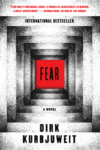Thousands of pages and hours have been consumed debating the purposes of literature. Many, myself included, would agree with Nobel laureate Mario Vargas Llosa, who says it “enable[s] us to explore and to understand more fully the common human abyss.” And foreign authors like Vargas Llosa enable Americans to see the extent to which elements of the human condition are shared regardless of geography or culture.
Dirk Kurbjuweit’s novel Fear is a sterling example. It explores family disarray and moral codes. Despite the fact Kurbjuweit tells us most of the end of the story in the second chapter, there’s a sense of existential trepidation throughout.
The book is narrated by Randolph Tiefenthaler, a 45-year-old Berlin architect. He, his wife and two children live in the ground floor of a late 19th century home with flats in the basement, second floor and attic. When they meet Dieter Tiberius, the man who leases the basement flat, things seem normal. Unfortunately, Tiberius later makes suggestive comments to Tiefenthaler’s wife, Rebecca, and writes her love letters. His bizarre actions escalate. Soon he is writing notes and letters accusing the couple of abusing and molesting their children. (The plot is based upon Kurbjuweit’s own experiences more than a decade ago.)
 When Tiefenthaler goes to the police and lawyers trying to stop Tiberius, he finds there is nothing to be done since Tiberius hasn’t committed a crime. Tiefenthaler even offers to buy the basement flat from its owner, an offer that is rejected. Not only is Tiefenthaler frustrated, he fears someone may believe the allegations. Combined with the thought that he is failing to protect his family, Tiefenthaler’s self-loathing grows.
When Tiefenthaler goes to the police and lawyers trying to stop Tiberius, he finds there is nothing to be done since Tiberius hasn’t committed a crime. Tiefenthaler even offers to buy the basement flat from its owner, an offer that is rejected. Not only is Tiefenthaler frustrated, he fears someone may believe the allegations. Combined with the thought that he is failing to protect his family, Tiefenthaler’s self-loathing grows.
Tiefenthaler’s thoughts make clear he suffers an inordinate amount of angst. It’s apparent that much of it is tied up in the rocky relationship he had with his father growing up. Tiefenthaler’s father is infatuated with pistols; he has around 30 guns in their home. Each Saturday, his father would drive them to a shooting range for the two of them to shoot at targets. Tiefenthaler, though, had a strong aversion to his father’s passion and just before his 10th birthday refuses to go to the practice range any more. His younger sister eventually takes his place and the father-son relationship never improves.
Tiefenthaler can’t put his finger on the fear underlying his dislike of shooting with this father, just as he has a hard time understanding his dread in general. His relationship with Rebecca becomes strained, even to the point where Tiefenthaler begins to wonder if maybe Tiberius is telling the truth. “‘I trust you not to abuse our children’ is something you should have have to say,” he thinks one night as they sit in their living room.
Kurbjuweit’s pacing as Tiefenthaler’s turmoil increases not only heightens the sense of pressure but helps the reader grasp it. And while the reader knows how the story ends, the devil is in the details. Kurbjuweit, deputy editor of Der Spiegel, has won several awards for his reporting and is the author of several nonfiction works and novels. Translated by Imogen Taylor, Fear is his first book to be translated into English. It is an auspicious beginning.
The upwardly mobile are particularly afraid. We are afraid of losing what we have attained, because it is not secure, neither morally nor financially.
Dirk Kurbjuweit, Fear







